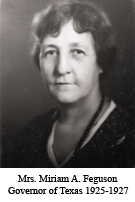Of “Ma” Ferguson and Mootness –
September 23, 2018 It’s an election year, which leads to ballot litigation, which leads to mootness problems as election deadlines approach, in cases such as Lee v. Dallas County Democratic Party, No. 05-18-00715-CV (Sept. 20, 2018) (mem. op.)
It’s an election year, which leads to ballot litigation, which leads to mootness problems as election deadlines approach, in cases such as Lee v. Dallas County Democratic Party, No. 05-18-00715-CV (Sept. 20, 2018) (mem. op.)
Election cases thus offer a well-defined guideline for when a case becomes moot; in the context of those cases, “[o]nce the time to practically permit continuing judicial scrutiny (including any attendant appellate review) of the absentee ballot has expired, the case has become moot.”
That well-developed standard can be a guide in other civil cases, especially those involving a decisionmaking process such as a director election. (The deadline in an election case can be earlier depending on the facts depending on the mechanics of ballot preparation, as “an election contest is moot once it becomes ‘too late to invalidate a candidate and print new absentee ballots in time for the beginning of the casting of ballots.'”)
Historical Note: Lee reminds that the development of these principles in Texas began with Sterling v. Ferguson, 53 S.W.2d 753 (Tex. 1932), a dispute about Mariam “Ma” Ferguson’s second election as governor.